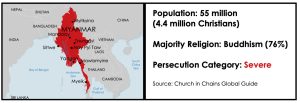 Myanmar, also known as Burma, is a former British colony that was taken over in 1962 by a military junta which imposed harsh military rule, brutally oppressing ethnic and religious minorities.
Myanmar, also known as Burma, is a former British colony that was taken over in 1962 by a military junta which imposed harsh military rule, brutally oppressing ethnic and religious minorities.
A transition to democracy began in 2010 under the leadership of Aung San Suu Kyi, but the military remained very powerful and in February 2021 the armed forces (the Tatmadaw, closely aligned with Burmese nationalism) carried out a brutal military coup. They had refused to accept the results of the 2020 election and deposed the government, imprisoning Aung San Suu Kyi and several other government leaders.
Since the coup the armed forces have murdered protesters, attacked ethnic-minority villages (including using air strikes against civilians) and executed opposition leaders. Ongoing aerial and ground attacks have killed thousands and destroyed infrastructure including schools, hospitals and places of worship.
In September 2024 the UN Office of the High Commissioner for Human Rights published a report on the civilian death toll since February 2021 which stated that at least 5,350 civilians had been killed and more than 3.3 million displaced, with over half the population living below the poverty line. Military and various armed groups were documented in 226 attacks on religious sites during the reporting period, including churches, monasteries and pagodas.
While military airstrikes and other attacks on civilian populations continue, particularly in ethnic minority areas, it was reported in early 2024 that the Tatmadaw had been greatly depleted through casualties and desertions since the coup and that anti-junta militia gains had reduced the area under the armed forces’ control to around 17%. It was also reported that the Tatmadaw intended to introduce conscription.
Christians in Myanmar
Christianity is portrayed as a foreign religion in Myanmar and most Christians belong to the Chin, Karen and Kachin ethnic minority groups, which have been oppressed historically by the Burmese majority. They experience violence and intimidation, attacks on church buildings and destruction of villages, and even before the coup more than one hundred thousand Christians had been forced to move to displacement camps. Converts to Christianity also suffer persecution from their families and communities.
The coup has exacerbated existing religious and ethnic tensions and persecution of Christians has increased greatly, with the military’s targeted attacks on Christian villages, churches and leaders forcing more Christians than ever before into camps for internally displaced people. Some have reportedly been forced to flee to the jungle, where they struggle to access to food and healthcare.
The Burma Human Rights Network reported in 2022 that the military junta had increased attacks in Chin, Kayah, Karen and Kachin states, which contain some majority-Christian regions, destroying dozens of church buildings in airstrikes and artillery shelling. The junta has also raided and occupied some church buildings to use as military bases. The majority-Christian Chin State has reportedly been hardest hit, with over 85 church buildings destroyed since the coup.
Persecution of Rohingya Muslims
The predominantly Muslim Rohingya ethnic group has faced fierce persecution by the Tatmadaw, with over 700,000 forced to flee from Rakhine state to neighbouring Bangladesh in a 2017 army operation that massacred over 9,000 Rohingya and destroyed nearly half of their villages.
Nearly one million Rohingya refugees are now living in squalid, overcrowded camps in Bangladesh. Approximately 600,000 remain under oppressive rule in Myanmar, where they are denied citizenship and thus lack any constitutional protections.
(Burma Human Rights Network, Christian Solidarity Worldwide, Church in Chains Global Guide 3rd and 4th Editions, International Christian Concern, Open Doors, Radio Free Asia, UN Office of the High Commissioner for Human Rights, USCIRF, World Watch List, Voice of the Martyrs Canada)
